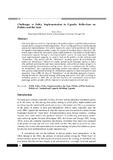Challenges to policy implementation in Uganda: Reflections on politics and the State
Abstract
Like many African countries, Uganda faces the problem of poor or failed implementation of state polices and government programmes. There is a big gulf between policy making and actual implementation. This article locates the source of the problem in the nature of Uganda’s contemporary politics under the regime of President Yoweri Museveni. The article argues that at the root of poor policy implementation is the failure to build robust institutional capacity through a merit-based public system. To understand Uganda’s weak implementation capacity, we need to look at the politics of elite-inclusion and “broad-base” that started with the “Movement” no-party system. By prioritizing the politics of “broad-base,” Museveni’s regime opened up the Ugandan society to wider elite political participation and mass representation, and achieved modest progress in institutionalizing decision/policy-making power. However, simultaneously, the politics of “broad-base” also engendered patronage politics and endemic corruption, which have greatly compromised building the institutional capacity to implement policies and programs. Since 1986, the idea of “broad-base” as the founding approach of power sharing became an entrenched strategy of keeping state power even after reverting to multiparty politics in 2005. The net outcome has been the continuation of deleterious patronage-politics at odds with the imperatives of a development-oriented state.

